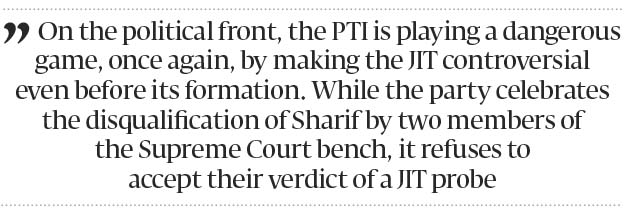Assumptions in the Panama verdict and beyond
The political temperature of the country is expected to rise with the onset of the harsh summer

The writer is a freelance columnist based in Islamabad. He tweets @raj_omer
In the judgment authored by Justice Khosa, he observes that there are inconsistencies in the speeches made by the prime minister and his family regarding the ownership of the London flats. He laments the lack of documented trail in the setting up and sale of factories in Dubai and Jeddah, the business deals between Nawaz Sharif and the Al-Thani family and the subsequent purchase of the flats. He writes that there is a “real likelihood” that the relevant properties in London had actually been purchased by the premier. He further writes that when a public office-bearer is in possession of an asset that is deemed disproportionate to his known sources of income then it is for him to “account for” it, thereby placing the onus on Sharif to prove his innocence. Khosa acknowledges this departure from traditional adjudication when he states that since new avenues of hiding ill-gotten have emerged, different approaches to concluding as to whether the allegations of corruption levelled against an accused are true or not have to be adopted. He also writes in his judgment that it is “more likely than not” that the offshore companies and London flats were set up or taken over at a time when Sharif was holding public offices in Pakistan.

Justice Ejaz Afzal Khan, who authored the majority judgment, noted that enough doubts have been created in the story advanced by Sharif’s counsel and that merits further investigation. However, mere suspicion cannot be used to rule a disqualification notification against the PM. Due process of law and the right to trial and appeal, in fact all stages of inquiry are the fundamental right of every individual in Pakistan and an exception cannot be made for just one particular case. The majority judgment also declared that a member of parliament is required to account for the sources of his assets in a trial before an accountability court but not under a proceeding under Article 184(3) as in the current case. Also, the bench under its jurisdiction under Article 184(3) of the Constitution cannot disqualify a member of parliament on facts that are disputed between the petitioner and the defendant. For this purpose of determining the actual truth of the stated facts a Joint Investigation Team (JIT) has been composed on the reports of which the disqualification of the premier will be reassessed.
In summary, Justice Khosa and Justice Gulzar have taken the aid of sufficient suspicious circumstances, in spirit of the law and constitution and not its letter in giving their judgment. It is interesting to note that the majority judgment of the remaining bench is the perfect antithesis to the reasoning and judicial wisdom resorted to by the former two judges. There is already a contentious debate over the minority opinion in the verdict and will perhaps remain so in legal circles for many years.
On the political front, the PTI is playing a dangerous game, once again, by making the JIT controversial even before its formation. While the party celebrates the disqualification of Sharif by two members of the Supreme Court bench, it refuses to accept their verdict of a JIT probe. Imran Khan is undermining a state institution, although it should not come as a surprise as this has been his preferred course of action for the last four years. He is knowingly questioning the independence of the JIT even though it will be working under the gaze of the Supreme Court.
While Imran publicly bashes the JIT formation, he is also projecting to his supporters that it is only a matter of time that the JIT will hold Sharif as corrupt thereby raising their hopes. The JIT will thus work under a cloud of immense populist pressure. And if the JIT probe does not go the PTI’s way, his supporters will again be left in the lurch with their trust in state institutions taking a further dent.
The possibility of a joint opposition between the PTI, the PPP and the JI is also on the cards but bringing them together will be an uphill task. Even if they do manage to come together, it remains to be seen if they can pack enough political punch to force Sharif to resign or to arrange an early election. The political temperature of the country is expected to rise with the onset of the harsh summer and its heat will surely be felt by everyone.
Published in The Express Tribune, April 27th, 2017.
Like Opinion & Editorial on Facebook, follow @ETOpEd on Twitter to receive all updates on all our daily pieces.















COMMENTS
Comments are moderated and generally will be posted if they are on-topic and not abusive.
For more information, please see our Comments FAQ